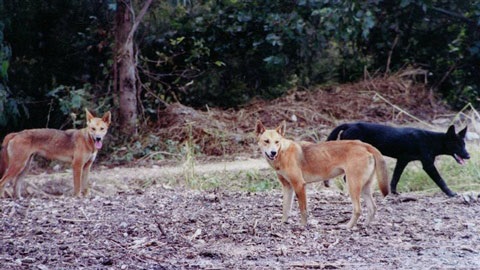Prohibited and restricted pest animals

All residents have a general biosecurity obligation to control pest animals on their land. This is under Queensland’s Biosecurity Act 2014.
Council’s Biosecurity Plan 2025-2030(PDF, 3MB) has restricted and prohibited animals listed by management intent categories:
- eradication
- working towards eradication
- containment
- asset protection (localised and targeted).
Restricted species present in City of Moreton Bay
The restricted species in City of Moreton Bay are as follows:
Working towards eradication
- Fire ants
- Red-eared slider turtles
- Yellow crazy ants
Containment
- Wild dogs (hybrid dingo and dingo)
- Feral deer
- Feral cats
- European red fox
- European rabbit and feral pig
Council’s pest management program
Council works to reduce pest animals' impact on residents and the environment.
Our pest animal management officers run control programs using best practice methods. These include mapping and monitoring activity and removing pest animals from the environment.
If you have a pest animal management matter that requires attention, contact Council.
Prohibited invasive animals
In Queensland, there are two classes of pest species: prohibited and restricted invasive animals.
A prohibited invasive animal is a harmful pest animal not found in Queensland. If a prohibited pest animal came into our state, it would damage our health, lifestyle, economy and environment.
If you find a prohibited invasive animal, you must report it to Biosecurity Queensland within 24 hours.
Find out more information about prohibited invasive animals and how to report them.
Restricted invasive animals in Moreton Bay
Restricted invasive animals are harmful pest animals that are in Queensland. We need to limit their impact by reducing, controlling, or containing them.
Fire ants
Fire ants are a dangerous imported pest. They can damage the environment, our outdoor lifestyle and the agriculture and tourism industries.
If you see ants or a nest you suspect could be fire ants, you must report them to Biosecurity Queensland.
Find out more about fire ants and how to report them.
Wild dogs
Moreton Bay is one of many areas in South-East Queensland with a resident wild dog population. The term ‘wild dog’ refers to escaped or released domestic dogs that now live in the wild. It also includes purebred dingoes and dingo hybrids.
Wild dogs cause stock and domestic animal losses and prey on native wildlife such as koalas. They are territorial animals. This can cause conflict when they meet domestic dogs, resulting in injury or death to pets.
You must not attract these dogs to your property. It is your responsibility to manage wild dogs on your land.
Wild dogs appear skinny and malnourished. Do not feed wild dogs under any circumstances. Do not leave domestic dog food in areas that wild dogs can access. Pick up any fallen fruit from orchards or trees.
Report a wild dog sighting or attack
If you see a wild dog or experience a wild dog attack, report it to Council.
Include as much information as possible in your report. Include the date, location, description of the dog, its activity and any damage caused.
Council officers will use these reports to start control measures in target areas.
Report wild dog sightings or attacks
Wild dog management programs
Council has extensive management programs to help lessen the impact of wild dogs.
Officers work with State Government departments and neighbouring Councils for a regional approach.
Pest management includes trapping and removing wild dogs from the environment. Council also conducts coordinated 1080 baiting programs at strategic times throughout the year.
Australian native animals have developed a high tolerance to the bait. They have evolved with naturally occurring 1080 in native plants.
The 1080 bait is toxic to domestic dogs. You must not allow pet dogs to roam during baiting sessions. Muzzle working dogs within the baiting zone to ensure they do not encounter baits.
Before the baiting program starts:
- Officers install roadside signage to notify visitors to the area of the program.
- Council sends notification letters to properties within a kilometre of a baiting zone.
If you would like to join the program or for further information, contact Council.
Other restricted invasive animals
Find out more about other restricted invasive animals found in Moreton Bay:
Find out more information about the legislative requirements for restricted invasive animals.